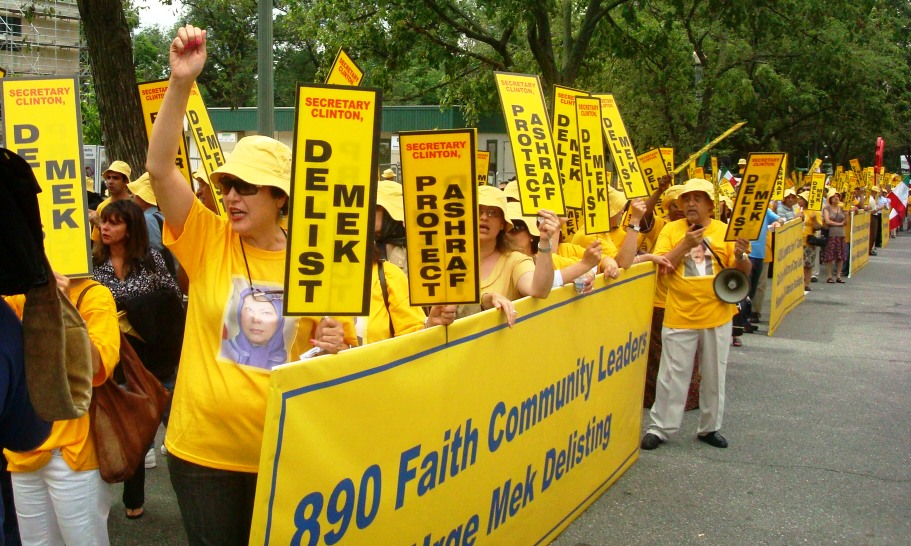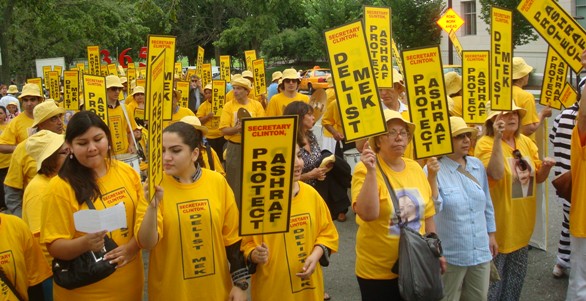Reuters
By Patrick Worsnip
UNITED NATIONS, July 19 (Reuters) – U.N. chief Ban Ki-moon called in a report made public on Tuesday for stepped-up efforts to resolve the problem of Iranian exiles living at a camp in Iraq that was the scene of a bloody clash in April.
Camp Ashraf, some 65 km (40 miles) from Baghdad, houses the People's Mujahideen Organization of Iran (PMOI), which mounted attacks on Iran before the U.S.-led overthrow of former Iraqi leader Saddam Hussein in 2003.
The future of the camp has been uncertain since the United States turned it over to Iraqi control in 2009. Unlike Saddam, who fought an eight-year war with Iran in the 1980s, Iraq's current government is sympathetic towards Tehran and has vowed to close the camp by the end of this year.
In April, the camp — which houses 3,400 people — was the scene of clashes between Iraqi security forces and residents, 34 of whom were killed according to a U.N. investigation.
“I … encourage all stakeholders involved to increase their efforts to explore options and seek a consensual solution that ensures respect for Iraq's sovereignty while also being consistent with international human rights law and humanitarian principles,” Ban said in a regular report on Iraq.
“To this end, I call upon (U.N.) member states to help to support and facilitate the implementation of any arrangement that is acceptable to the government of Iraq and the camp residents,” the U.N. Secretary-General added.
Earlier this month, PMOI leader Maryam Rajavi rejected a U.S. proposal to move the camp residents to another location chosen by the Iraqi government, saying the plan would lead to a “massacre.” The PMOI is officially considered a terrorist group by Washington but enjoys some support in the U.S. Congress.
Camp residents have voiced fears that they will eventually be handed over to Iran.
INVESTIGATION PENDING
In his report, Ban urged Iraqi authorities to refrain from use of force and ensure adequate access for camp residents to goods and services.
Rights group Amnesty International said in a statement last week that Iraq should halt “harassment” of the exiles, who have said they could not buy basic medicines and had been denied permission to travel outside the camp for medical treatment.
At a Security Council debate on Iraq on Tuesday, Baghdad’s U.N. Ambassador Hamid Bayati said his country had allowed U.N. representatives and U.S. forces to enter the camp to deliver food and medicine.
He also said Baghdad had expressed a willingness to start an investigation of the April clash, a probe that Ban said “remains pending.”
Bayati said Iraq had decided “to work on (camp residents’) resettlement and guaranteeing their human rights” but gave no details of its plans. He charged that the PMOI “considers the camp as liberated and holy territories for them and refuses to leave it, which is a stark challenge to Iraq's sovereignty.”
Bayati said the April clashes started after Iraqi forces attempting to assert control of part of the camp were attacked with fire bombs and knives.
But Mohammad Mohadessin, a Paris-based representative of the camp residents, said in a statement sent to Reuters that Ban’s account of the incident “clearly lays bare the lies by the Iraqi ambassador.” (Editing by Cynthia Osterman)
http://www.trust.org/alertnet/news/un-chief-urges-solution-to-iranian-exiles-in-iraq


